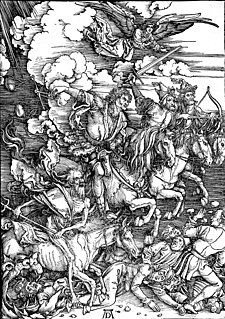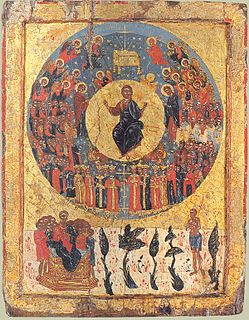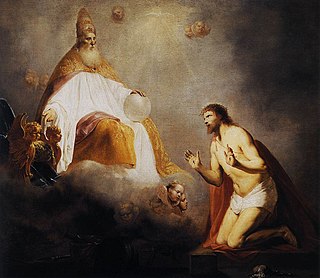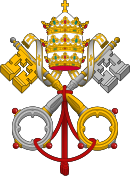
Christian eschatology, a major branch of study within Christian theology, deals with "last things". Such eschatology – the word derives from two Greek roots meaning "last" (ἔσχατος) and "study" (-λογία) – involves the study of "end things", whether of the end of an individual life, of the end of the age, of the end of the world, or of the nature of the Kingdom of God. Broadly speaking, Christian eschatology focuses on the ultimate destiny of individual souls and of the entire created order, based primarily upon biblical texts within the Old and New Testaments.

Eschatology concerns expectations of the end of the present age, human history, or of the world itself. The end of the world or end times is predicted by several world religions, which teach that negative world events will reach a climax. Belief that the end of the world is imminent is known as apocalypticism, and over time has been held both by members of mainstream religions and by doomsday cults. In the context of mysticism, the term refers metaphorically to the end of ordinary reality and to reunion with the divine. Various religions treat eschatology as a future event prophesied in sacred texts or in folklore.

The Second Coming is a Christian and Islamic belief that Jesus will return again after his ascension to heaven about two thousand years ago. The idea is based on messianic prophecies and is part of most Christian eschatologies.

The rapture is an eschatological theological position held by some Christians, particularly within branches of American evangelicalism, consisting of an end-time event when all Christian believers who are alive, along with resurrected believers, will rise "in the clouds, to meet the Lord in the air." The origin of the term extends from Paul the Apostle's First Epistle to the Thessalonians in the Bible, in which he uses the Greek word harpazo, meaning "to snatch away" or "to seize," and explains that believers in Jesus Christ would be snatched away from earth into the air.
Premillennialism, in Christian eschatology, is the belief that Jesus will physically return to the Earth before the Millennium, a literal thousand-year golden age of peace. Premillennialism is based upon a literal interpretation of Revelation 20:1–6 in the New Testament, which describes Jesus's reign in a period of a thousand years.

The concept of the kingship of God appears in all Abrahamic religions, where in some cases the terms Kingdom of God and Kingdom of Heaven are also used. The notion of God's kingship goes back to the Hebrew Bible, which refers to "his kingdom" but does not include the term "Kingdom of God".

Amillenarism or amillennialism is a type of chillegorism which teaches and believed that there will be no millennial reign of the righteous on Earth. Amillennialists interpret the thousand years symbolically to refer either to a temporary bliss of souls in heaven before the general resurrection, or to the infinite bliss of the righteous after the general resurrection.

Matthew 6:10 is the tenth verse of the sixth chapter of the Gospel of Matthew in the New Testament and is part of the Sermon on the Mount. This verse is the second one of the Lord's Prayer, one of the best known parts of the entire New Testament. This verse contains the second and third petitions to God.
Futurism is a Christian eschatological view that interprets portions of the Book of Revelation, the Book of Ezekiel, and the Book of Daniel as future events in a literal, physical, apocalyptic, and global context.

In Christianity, the Confession of Peter refers to an episode in the New Testament in which the Apostle Peter proclaims Jesus to be the Christ. The proclamation is described in the three Synoptic Gospels: Matthew 16:13–20, Mark 8:27–30 and Luke 9:18–21. Depending on which gospel one reads, Peter either says: 'You are the Messiah' or 'the Christ' ; or 'You are the Messiah, the Son of the living God',, or 'God's Messiah' or 'The Christ of God'.

In Seventh-day Adventist theology, there will be an end time remnant of believers who are faithful to God. The remnant church is a visible, historical, organized body characterized by obedience to the commandments of God and the possession of a unique end-time gospel proclamation. Adventists have traditionally equated this "remnant church" with the Seventh-day Adventist denomination.

God in Christianity is believed to be the eternal, supreme being who created and preserves all things. Christians believe in a monotheistic conception of God, which is both transcendent and immanent. Christian teachings on the transcendence, immanence, and involvement of God in the world and his love for humanity exclude the belief that God is of the same substance as the created universe but accept that God's divine nature was hypostatically united to human nature in the person of Jesus Christ, in a unique event known as "the Incarnation".

Mormon cosmology is the description of the history, evolution, and destiny of the physical and metaphysical universe according to Mormonism, which includes the doctrines taught by leaders and theologians of The Church of Jesus Christ of Latter-day Saints, Mormon fundamentalism, the Restoration Church of Jesus Christ, and other Brighamite denominations within the Latter Day Saint movement. Mormon cosmology draws from Biblical cosmology, but has many unique elements provided by movement founder Joseph Smith. These views are not generally shared by adherents of other Latter Day Saint movement denominations who do not self-identify as "Mormons", such as the Community of Christ.
Members of The Church of Jesus Christ of Latter-day Saints and other adherents in the Latter Day Saint movement, believe that there will be a Second Coming of Jesus Christ to the earth sometime in the future. The LDS Church and its leaders do not make predictions of the actual date of the Second Coming.

Mormonism and Nicene Christianity have a complex theological, historical, and sociological relationship. Mormons express their doctrines using standard biblical terminology and have similar views about the nature of Jesus Christ's atonement, bodily resurrection, and Second Coming as traditional Christianity. Nevertheless, most Mormons do not accept the Trinitarian doctrine of Nicene Christianity, codified in the Nicene and Nicene-Constantinopolitan Creeds of 325 and 381. Although Mormons consider the Protestant Bible as scripture, they do not believe in biblical inerrancy. They have also adopted additional scriptures that they believe to have been divinely revealed to Joseph Smith, including the Book of Mormon, the Doctrine and Covenants, and the Pearl of Great Price. Mormons practice baptism and celebrate the sacrament, but they also participate in other religious rituals. Mormons self-identify as Christians.

Christian theology is the theology of Christian belief and practice. Such study concentrates primarily upon the texts of the Old Testament and of the New Testament, as well as on Christian tradition. Christian theologians use biblical exegesis, rational analysis and argument. Theologians may undertake the study of Christian theology for a variety of reasons, such as in order to:

In Christianity, heaven is traditionally the location of the throne of God and the angels of God, and in most forms of Christianity it is the abode of the righteous dead in the afterlife. In some Christian denominations it is understood as a temporary stage before the resurrection of the dead and the saints' return to the New Earth.

Eternal life traditionally refers to continued life after death, as outlined in Christian eschatology. The Apostles' Creed testifies: "I believe... the resurrection of the body, and life everlasting." In this view, eternal life commences after the second coming of Jesus and the resurrection of the dead, although in the New Testament's Johannine literature there are references to eternal life commencing in the earthly life of the believer, possibly indicating an inaugurated eschatology.

The Kingdom of God is one of the key elements of the teachings of Jesus in the New Testament. Drawing on Old Testament teachings, the Christian characterization of the relationship between God and humanity inherently involves the notion of the Kingship of God. The Old Testament refers to "God the Judge of all" and the notion that all humans will eventually "be judged" is an essential element of Christian teachings. Building on a number of New Testament passages, the Nicene Creed indicates that the task of judgment is assigned to Jesus.














